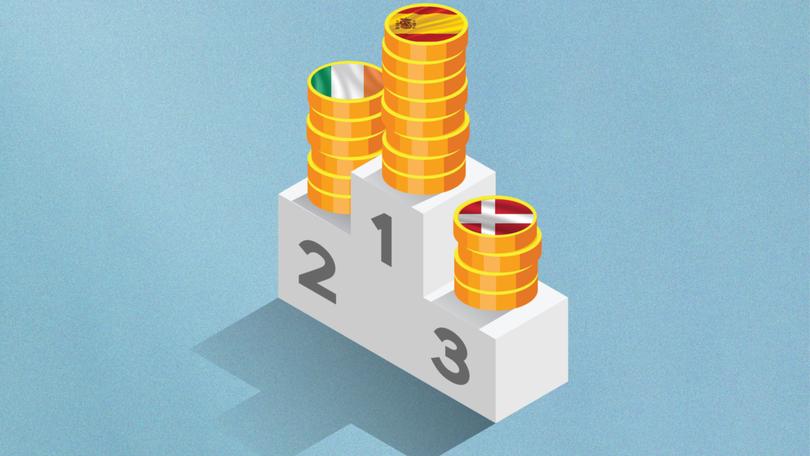THE ECONOMIST: Which economy did best in 2024 and where does Australia rank?
We rank countries on five measures.

Interest rates at their highest in decades, wars in Europe and the Middle East, elections in countries as important as America and India. No matter. The world economy delivered another strong performance in 2024; according to the IMF, global GDP will rise by 3.2 per cent. Inflation has eased and employment growth remains solid. Stock markets have risen by more than 20 per cent for the second consecutive year.
Yet, as ever, the rosy global picture conceals wide variation between countries. To assess these differences, we have compiled data on five economic and financial indicators—GDP, stock market performance, core inflation, unemployment and government deficits — for 37 mostly rich countries. We then ranked each economy based on its performance on these measures to create a combined score. The table below shows these rankings. Who are the winners?
The Mediterranean’s rally rolls on for the third consecutive year, with Spain at the top of this year’s list. Greece and Italy, once emblematic of the eurozone’s woes, continue their strong recoveries. Ireland, which has attracted lots of tech firms, and Denmark, home to Novo Nordisk of Ozempic fame, round out the top five.
Sign up to The Nightly's newsletters.
Get the first look at the digital newspaper, curated daily stories and breaking headlines delivered to your inbox.
By continuing you agree to our Terms and Privacy Policy.Meanwhile, northern European heavyweights disappoint, with underwhelming performances from Britain and Germany. The Baltic duo of Latvia and Estonia find themselves back at the bottom, a position they also occupied in 2022.
Our first indicator is real GDP growth, widely regarded as the most reliable measure of an economy’s overall health. This year global GDP was buoyed by the resilient American economy and its free-spending consumers. Israel emerged as another standout performer, according to OECD data, though its strong growth largely reflects a rebound from a sharp contraction in the final quarter of 2023, when its fight with Hamas began. In Spain annual GDP growth is on track to exceed 3 per cent, driven by a strong labour market and high levels of immigration, which mechanically lifts economic output. Although the country’s GDP per person has also risen, it has done so by less than overall GDP.
Elsewhere, growth has been underwhelming. Germany and Italy have been hampered by high energy prices and sluggish manufacturing industries. Japan is set to post a meagre 0.2 per cent growth, weighed down by weaker tourism and a struggling car industry. Hungary and Latvia have both slipped into recession.
Our second measure is stock market returns. Investors shrugged off a rocky August, when the unwinding of the yen carry trade prompted fears of a crisis. American equities have delivered impressive inflation-adjusted returns of 24 per cent, as valuations for tech firms, already lofty, climbed higher.
Canada’s market, closely linked to its southern neighbour, also posted healthy gains, bolstered by strong performances in the energy and banking industries. Japan’s Nikkei 225 hit a record high, even if its overall annual performance was middling. There were some losers. Share prices in Finland are in negative territory, in real terms, and South Korea’s stock market tumbled in the wake of an attempted self-coup by the president on December 3rd.
Next we turn to core inflation, which strips out volatile components like energy and food to indicate underlying price pressures. Although global inflation has fallen significantly, prices of services remain stubbornly high in many countries. In Britain wage growth continues to drive up services costs, meaning core inflation is uncomfortably elevated. Germany is facing similar pressures. In Australia rising housing costs are one culprit. By contrast, France and Switzerland have managed to keep price pressures in check, with core inflation rates comfortably below 2 per cent.
A classic marker of economic misery is rising unemployment, which is what many predicted when central bankers began to raise interest rates (and artificial intelligence grew more sophisticated). Yet despite some loosening, labour markets remain surprisingly robust, with unemployment rates near record lows. Southern Europe, which still suffers from high unemployment, has seen remarkable improvement: joblessness in Greece, Italy and Spain has fallen to its lowest in more than a decade. Italy has enjoyed the most progress, with joblessness dropping by 1.4 percentage points since the start of the year. In America and Canada, where unemployment has ticked up slightly, the trend is largely attributable to the fact that people are returning to the labour force and high levels of immigration.
Our final measure looks at fiscal balances, excluding interest payments, as a share of GDP. After years of big spending, consolidation is required in many countries to ensure that debt burdens stay manageable. Denmark and Portugal stand out for achieving rare budget surpluses through fiscal discipline. Norway and Ireland also boast surpluses, though for other reasons: Norway owing to oil revenues and Ireland to a corporate-tax windfall, bolstered by a multibillion-dollar back-tax payment from Apple, a tech giant.
Most governments, however, continue to spend with abandon. Poland’s primary deficit exceeded 3 per cent of GDP, owing to a rise in defence spending in response to Russia’s war in Ukraine. In Japan hefty fiscal stimulus, aimed at propping up the economy and easing cost-of-living pressures, risks compounding debt problems as an era of ultra-low interest rates comes to an end. Britain’s debt trajectory is deteriorating; its latest budget failed to repair the public finances. France is mired in political turmoil and unable to restrain spending.
As 2025 comes into view, the global economy faces new challenges. Nearly half the world’s population lives in countries that held elections this year, many of which ushered in leaders who might be described as “unpredictable”. Trade is under threat, government debt is swelling and stockmarkets have little room for error. For now, at least, Spain, Greece and Italy—long belittled by their northern neighbours—can bask in their economic resurgence. They deserve a fiesta.
